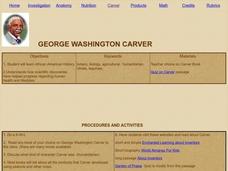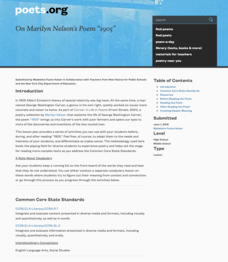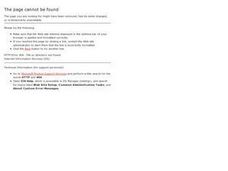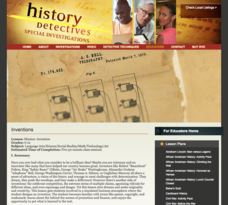Curated OER
George Washington Carver
Students learn and research the life of George Washington Carver. In this historical figures lesson, students read a book on George Washington Carver, discuss his character and the challenges he faced in becoming a botanist. Students...
Curated OER
Who is George Washington Carver, Anyway?
Students read about George Washington Carver, then work in small groups to design, write and illustrate a booklet about his accomplishments.
Curated OER
George Washington Carver
Learners use the internet to identify the contributions of George Washington Carver. In groups, they analyze how his contributions influenced others and the economy we have today. They create a poster showing his accomplishments and...
Curated OER
The Life of George Washington Carver
Second graders investigate historic Americans by researching George Washington Carver. In this famous American biography lesson, 2nd graders complete graphic organizers about George Washington Carver's life while researching the...
Curated OER
Power to the Peanut
Students locate information about the life and research of African American botanist George Washington Carver. They identify how Carver's knowledge of botany contributed to improvement of farming practices and introduction of new...
Education City
Black History Month
Enhance Black History Month with a twenty-page resource designed to boost scholars' knowledge of the great accomplishments made by African Americans. Learners take in fun facts about famous inventors such as George Washington Carver and...
Academy of American Poets
On Marilyn Nelson's Poem “1905”
Marilyn Nelson's poem, "1905," asks young scholars to compare and contrast George Washington Carver and Albert Einstein. After studying images of the two scientists and listing their observations, class members listen to several readings...
Curated OER
Social Studies: Thank you Mr. Carver
Learners explore the life of George Washington Carver and his inventions. they discover his uses for peanuts and sweet potatoes and how his inventions are still in use today. Students write letters to Carver about his inventions.
Curated OER
Agriculture Awareness Through Poetry
Whether you are viewing a landscape painting of a farm, examining a still-life portrait of a bowl of fruit, or reading a descriptive poem about cultivating food, you can't deny that agriculture plays a major role in visual and language...
Curated OER
Go Nuts with Peanuts
Students learn about peanuts through online research. In this peanut lesson, students use provided links to research information on the origins of the peanut. Students collect information about peanuts also called goobers.
Curated OER
The Peanut Wizard
Students read and discuss information regarding George Washington Carver and how the peanut became cultivated in the southern colonies of the United States. In this George Washington Carver lesson, students develop vocabulary that...
Curated OER
THE PEANUT WIZARD
Students read information about George Washington Carver and outline the information. They are given peanuts in the shell, students examine them and eat them. Students discuss the following questions: Why did George Washington Carver...
Curated OER
Cultural Connections
Students explore the concept of philanthropy. In this service learning instructional activity, students examine the impact of the works of Cesar Chavez, George Washington Carver, Sunderlal Buhuguna, and Abdul Sattar Edhi.
Curated OER
Scientists and Inventors
Students explore human discovery by reading historical stories in class. In this inventors instructional activity, students define the terms scientist, invention, inventor and discovery before discussing the many differences between...
PBS
Inventions
Use this lesson plan to discuss inventions that have changed your class's world and have impacted society. Middle schoolers investigate important inventions of their time and design an invention in a simulated business atmosphere. Modify...
Curated OER
Famous African-American Fabric Paintings
Students examine famous African-Americans. For this African-Americans lesson, students research and give an oral report on a famous African-American.
Curated OER
Nebraska Entrepreneur Success Stories
Students explore entrepreneurs of Nebraska. In this business and social studies instructional activity, students research Nebraska entrepreneurs to discover the history of their successful company.
Curated OER
Soybean Science
Fourth graders explore food science by participating in a cooking activity. In this soybean oil lesson, 4th graders listen as the teacher gives them a background on soybeans and their use by humans today. Students grind soybeans and...
Curated OER
Examining the African American Role in New Haven History: Pride in the Past? Hope for the Future
Fifth graders examine the role of African-Americans in New Haven, Connecticut. Using two maps, they compare and contrast the differences in the town from the past to today. In groups, they use the internet to research the contributions...
Curated OER
Kwanzaa Language Arts: The Tambiko
Students read or hear about famous African Americans to learn about the ways in which they exemplify one of the seven principles of Kwanzaa.
Curated OER
Create a Timeline
Students make a timeline from the late 1800's to 2000 to mark significant inventions.






















